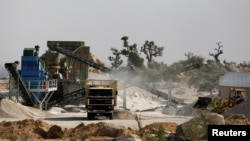Nigeria concluded a three-day conference Wednesday to mark National Mining Week. Authorities in the West African nation have been seeking to expand investments in the mining industry in a bid to diversify the economy, amid the global surge in demand for minerals.
The conference, attended by government officials, mining industry players and international investors, was part of the Nigerian government's campaign to boost not only mining, but also local processing of the minerals extracted.
Earlier this year, the Nigerian government said new investors will be required to set up local processing plants if they want to obtain a mining license.
Mary Ogbe, permanent secretary of the mining and solid minerals industry, spoke about the impending changes.
"Before now, people will come in, cart away our minerals and go and refine [them] and bring [them] back and then we're paying so much on what belongs to us,” she said. “Now, with the local value addition, no one is allowed to legally carry out our products without adding value. Now, this is creating jobs.”
Nigeria has rich deposits of more than 40 minerals, including tin, iron ore, lead, zinc and gold. The country is also a new source of lithium, a metal used in batteries and electric vehicles.
But the country's minerals are often illegally exploited and exported without generating much revenue locally.
At the summit authorities pledged to address the problem by investing in mining technologies, surveillance, data gathering, community enlightenment and enforcement of mining laws.
In March, authorities deployed 2,500 agents to police unauthorized mining activities.
This week, the government said the “Mining Marshal Corps” has arrested more than 300 illegal miners, including foreign nationals.
But economist and founder of the Center for Social Justice Eze Onyekpere said authorities are still not doing enough to boost income from the mining sector.
"It's been a mantra of successive governments to improve government revenue by diversifying into the solid minerals sector, but we're getting very infinitesimal sum of money from solid minerals mining,” he said. “And it's not as if we don't have enough solid minerals or that mining is not taking place, it is because solid minerals mining has been converted to a criminal activity especially in those areas where there's security threats and crisis but the federal government has not taken it seriously."
Despite the government's lofty goals, the mining sector contributed only about 0.77% of Nigeria’s GDP last year.
Onyekpere says until the government gets more serious, Nigeria's mining industry will not be able to reach its potential.




